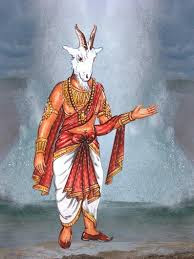CHAPTER XIX
(KSHATRA YUGA DESCRIBED)
Janamejaya said:—O Brahman, I have heard of the first Yuga which is called Brahma because it leads to the attainment of Brahman. O Lord, I wish to hear now some thing about the Kshatrayuga which abounds in regulations, brief and explanatory, which is sung by the Rishis conversant with expedients and which is beautified with sacrifices (1-2).
Vaishampāyana said:—I will sing the greatness of this Kshātrayuga, which is adored with diverse charities and sacrifices and beautified with many creatures (3). In this Kalpa the Lord, who knows himself as the four-armed Vishnu, seeing differences and incarnating himself as Daksha begotten by Brahmā, procreated many offspring. On account of his being shorn of attachments for the senses and the body he flourished amongst the Brāhmanas as having his soul immersed in communion and endued with the knowledge of inner self. All these Brāhmanas, who were of the size of a thumb, were capable of passing through the solar region and ranging over all other lokas by virtue of the regulations leading to emancipation and other religious rites. They were always busy with sacrifices and with controlling the senses and mental faculties. In order to gain the pleasure of Iswara they engaged themselves in Vedic rites. They were masters of the three Vedas. They led the life of celibacy and were enlightened with the knowledge of Brahman. These Brāhmanas, of good conduct and consummate understanding, met with death after thousands of years (4–8). The Brāhmanas are pervaded by the quality of Sattwa, the Kshatriyas by that of Rajas, the Vaishyas by that of Raja-Tamas and the Sudras by Tamas (9). The colour of Brāhmanas is white, that of the Kshatriyas is red, that of the Vaishyas is yellow and that of the Sudras is smoky-dark. Thus they have been divided by the thoughtful Vishnu (10). O king, thus according to qualities and colour, men are divided, in this world, into Brāhmanas, Kshatriyas, Vaishyas and Sudras. Observing highly wonderful and different sorts of duties, men of the same size, although apprized of the means of the works, are divided into four Varnas for partaking of the fruits thereof (11-12). The first three castes are entitled to perform the rites laid down in the Vedas. Therefore, O king, on account of your faith in Vishnu, you are entitled to read the Vedas. And therefore the birth of the three Varnas, namely, the Brāhmanas, the Kshatriyas and the Vaishyas is owing to Lord's grace. Encompassed with works affording enlightenment regarding the true form of Vishnu, the Lord Prāchetas Daksha, through his Yoga power and wisdom, undertook the work of creation. Thereupon, for the advancement of arts and serving the three other Varnas the Sudras were produced. They are not entitled to perform the ceremony of initiation and read the Vedas. As before fire is produced from a piece of rod by concussion smoke rises, but it does not serve the practical purpose, so the Sudras, taking birth in this world, have multiplied themselves, but they, not being initiated, cannot perform the various Vedic rites (13–17).
Thereupon Daksha begat his other sons who were the supporters of the Vedas, strong, endued with great energy, power and effulgence. Daksha said to them:—"O ye powerful sons, from your mouths I wish to know the strength of your mother, the earth. I am powerful and therefore cannot find out the end of the earth; you should be like me. Afterwards ascertaining the truth I will distribute energy and strength amongst creatures. On account of the vastness of the soil my creatures will multiply themselves." The goddess, earth, the essence of the great creative energy of the Lord, did not show herself unto Daksha's sons who were desirous of seeing her. When in the Krita age the pure souls, of the sons of Prajāpati pervaded by the quality of Sattwa, are purified with seeing the Prakriti, Nature, the mother of all creatures, without being urged on by Purusha, creates all engendered by sweat and eggs and decreases and increases all creatures who, by nature, partake of the fruits of works (18-23).
Source: https://archive.org/details/AProseEnglishTranslationOfHarivamsh
| Previous | | Source | | Tamil Translation | | Next |
